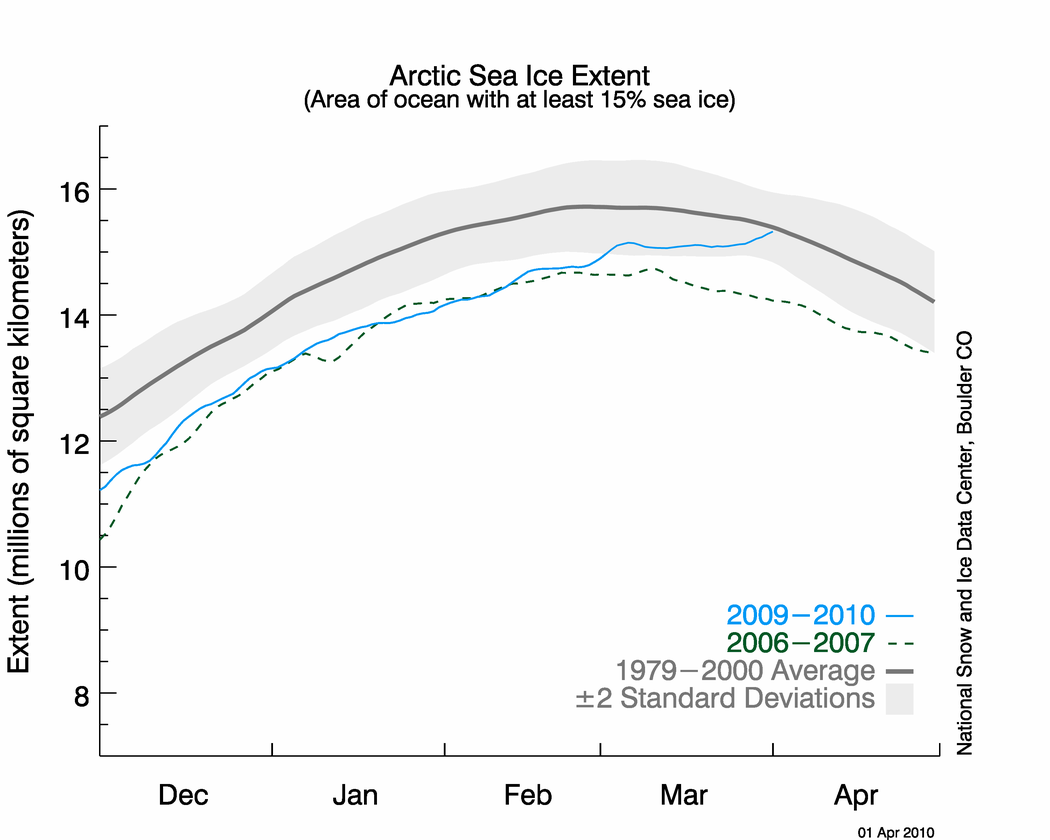Friday, April 02, 2010
Buried climate story of the day
Well, waddya know. Arctic sea ice is well within the satellite-era normal range and right at the long term mean. I'm sure a spate of news stories about how maybe the Arctic sea ice is not disappearing after all is just around the corner. Not.
8 Comments:
By Brian, at Sat Apr 03, 01:14:00 AM:
You'll see as many stories as you saw in January about the ice being at a record low: in other words, none.
The long-term trend is what counts, and it's bad. This year is no exception, unless you're brave enough to predict the current level is going to last.
By Don Cox, at Sat Apr 03, 04:31:00 AM:
Your comment is true only for March this year. Otherwise, the lines for both 2006-7 and 2009-10 are well below the average for 1979-2000.
By TigerHawk, at Sat Apr 03, 06:53:00 AM:
The real fight is whether wind or temperature (within a range) are the primary drivers of sea ice extant. Some would say that the big volatility in the relative number is evidence that the bigger factor is wind, rather than warming. At least so far.
By Assistant Village Idiot, at Sat Apr 03, 05:39:00 PM:
Don, but it's supposed to be shrinking. Year upon year. Inexorably. After years of reported shrinkage and danger, here we are, WNL.
Actually, it's too bad. We could use a bit of global warming.
By , at Sat Apr 03, 09:33:00 PM:
Global warming could cause some problems.
OTOH, global cooling would definitely kill millions if not billions of humans.
By JPMcT, at Sun Apr 04, 09:18:00 AM:
By "long term", Brian...I assume you are talking about the next 100,000 years, since that is the only scale that really means anything based on the quality of our data.
Science that is "settled" is not science.
By Brian, at Sun Apr 04, 05:00:00 PM:
JP, by long term I mean on a scale where the human impact normally outweighs random variability, which varies from as short as five years for something like sea level rise, ten years for something like Arctic ice decline, and 20-30 years for global temperatures. We don't yet know what 100,000 years of human technological impact would be on the climate.
I can tell you though that the chance that events that happen on 100,000 year cycles are unlikely to explain the rapid changes that we're seeing. I'm not willing to roll the dice and hope it's natural, especially when there's no science behind the claim it's just a natural cycle that we can't explain.
By JPMcT, at Mon Apr 05, 10:24:00 PM:
The period of time that it going to take to show any relevant effect of petrol fuel use on our environment is very likely about as long as those fuels will be available.
In other words...it's really a moot point.
We should use the fuels that rare available...and fund the alternatives generously.
Of course, if we decide to use the ALLEGED dangers to promote socialist politcal agendas...then our economies will NEVER be able to afford the time, effort, education and treasure that it will take to produce effective alternative fuels.
In other words, Brian...you cant have your cake and eat it, too.
If you support AGW because you are a socialist...you will probably lose.
If you want to see change...then support the global economy and things will naturally change out of necessity.
The "Chicken Little" approach has essentiall NO support. That card has been played too many times by the same people and it is simply not believable. The data is louse and the people that are reporting the data have no credibility.
It ain't gonna happen. Sorry.




